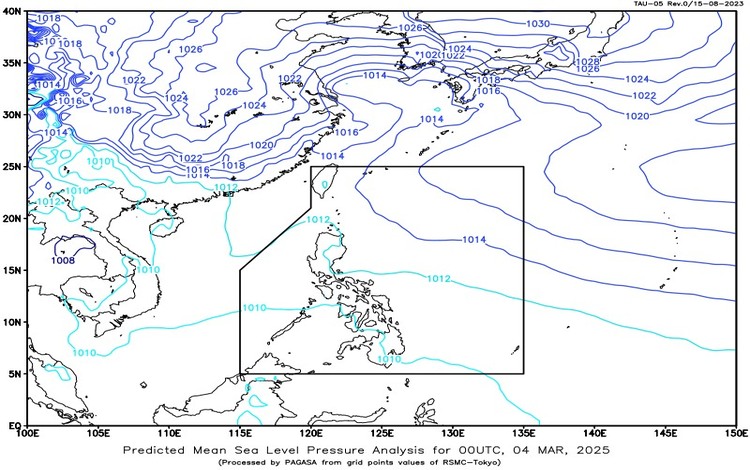The Philippine Atmospheric, Geophysical and Astronomical Services Administration (PAGASA) has released its weather forecast for Tuesday, March 4, 2025, highlighting the influence of the easterlies—warm winds originating from the Pacific Ocean—on the country’s weather patterns. These conditions are expected to bring varied weather scenarios across different regions.

Weather Conditions
- Affected Areas: Bicol Region, Caraga, Quezon, Marinduque, Romblon, Northern Samar, Eastern Samar, Leyte, Southern Leyte, and Davao Oriental.
- Forecast: These regions are anticipated to experience cloudy skies accompanied by scattered rains and thunderstorms.
- Potential Impacts: There is an elevated risk of flash floods or landslides due to moderate to occasionally heavy rainfall.
- Affected Areas: Metro Manila and the rest of the country.
- Forecast: Partly cloudy to cloudy skies with isolated rain showers or thunderstorms are expected.
- Potential Impacts: Severe thunderstorms in these areas may lead to flash floods or landslides.
Wind and Coastal Water Conditions
- Eastern Sections of Visayas and Mindanao:
- Wind Speed: Moderate to strong winds from the east.
- Coastal Waters: Moderate to rough conditions with wave heights ranging from 1.5 to 2.8 meters.
- Northern Luzon:
- Wind Speed: Light to moderate winds coming from the east to southeast.
- Coastal Waters: Slight to moderate sea conditions with wave heights between 0.6 to 2.5 meters.
- Rest of the Country:
- Wind Speed: Light to moderate winds originating from the east to northeast.
- Coastal Waters: Slight to moderate conditions with wave heights ranging from 0.6 to 2.5 meters.
Temperature and Heat Index
PAGASA has raised concerns regarding elevated temperatures and heat indices, particularly in urban areas like Metro Manila. The heat index, which measures the apparent temperature felt by the human body, is forecasted to reach up to 46 degrees Celsius in Metro Manila at the beginning of the week. This level falls under the dangerous category, posing risks such as heat cramps, heat exhaustion, and, in severe cases, heat stroke.
Similarly, Dagupan City in Pangasinan is expected to experience a heat index reaching the “danger” category on Tuesday, March 4, with temperatures potentially rising to 42ºC.
Class Suspensions Due to High Heat Index
In response to the anticipated high heat index, several local government units (LGUs) have proactively suspended classes on March 4, 2025, to ensure the safety and well-being of students:
- Bataan:
- Abucay (public and private schools)
- Hermosa (public and private schools)
- Orani (public and private schools)
- Samal (public and private schools)
- City of Manila:
- Face-to-face classes are suspended, with a shift to online or alternative modes of learning.
- Cavite:
- Bacoor: Suspension of face-to-face classes in both public and private schools.
- Adamson University:
- All levels will transition to online synchronous classes.
Additionally, cities like Marikina and Valenzuela have implemented measures to automatically suspend face-to-face classes when the heat index reaches 42 degrees Celsius or higher, based on PAGASA’s data.
Tropical Cyclone Outlook
PAGASA reports that no low-pressure area or tropical cyclone is expected to enter or develop within the Philippine Area of Responsibility (PAR) until the end of the week. Historically, the month of March sees minimal tropical cyclone activity, with the possibility of none or at most one tropical cyclone forming or entering the PAR. Should a tropical cyclone develop this month, it is projected to traverse the Visayas-Mindanao area towards Palawan or recurve away from landmasses.
Safety Precautions
Given the forecasted weather conditions and elevated heat indices, PAGASA advises the public to:
- For Rain-Prone Areas:
- Stay vigilant for signs of flash floods or landslides, especially in regions with scattered rains and thunderstorms.
- Monitor updates from local disaster risk reduction and management councils.
- For High Heat Index Areas:
- Limit outdoor activities during peak heat hours.
- Stay hydrated by drinking plenty of water.
- Wear lightweight and light-colored clothing.
- Be alert for symptoms of heat-related illnesses and seek immediate medical attention if necessary.
For the most accurate and up-to-date information, the public is encouraged to regularly check PAGASA’s official channels and heed advisories issued by local authorities.
